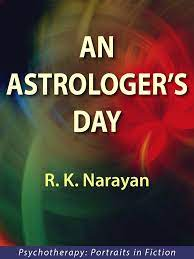This is the blog in response to Yesha Bhatt ma'am's assignment. This blog is about R. K. Narayan's short story An Astrologer's Day from Malgudi Days, and I'm addressing questions based on the original short story and a short film based on it.
About the Author:
R. K. Narayan was an Indian writer who was best known for his works set in the fictional South Indian town of Malgudi. He was a leading author of the early Indian English literature and is considered an important modern Indian novelist. His writing style is simple and fluid, and his stories are set in a familiar, rural Indian setting. He wrote about human relationships and the day-to-day lives of common people. Narayan's work is often compared to that of Anton Chekhov and William Faulkner.
Narayan was born in Madras, South India, in 1906. His father was a school headmaster, and his grandfather was a Sanskrit scholar. Narayan was educated at a number of institutions, including the Purandaradasa High School in Mysore and the Christian College in Madras. He briefly worked as a journalist for The Hindu before moving to England in 1930 to study at Oxford University.
Narayan's first novel, Swami and Friends, was published in 1935. It was followed by a series of other novels, including The Guide (1958), which was made into a successful film, and The Man-Eater of Malgudi (1961). Narayan's work was widely praised, and he was awarded the Sahitya Akademi Award in 1960. He was also made a Fellow of the Sahitya Akademi in 1964. Narayan died in Madras in 2001 at the age of 94.
An Astrologer's day is concerned with a Day's occurrence in the life of an impostor who makes a living by cunning guessing. Malgudi, a town in south India near Madras, serves as the scene for the narrative. Astrologer's Life is the story of a man who fled his hometown because he was convinced he was going to murder someone and claimed to be an astrologer. In an ironic twist of destiny, he stumbles across a man he had planned to assassinate.
This short story explores the harsher psychological elements of human nature, such as hypocrisy, cunning, vengeance, and greed. Every character in the novel experiences these emotions. It is the skill of an astrologer to deceive the guy in his search and mislead him in such a manner that he never has to confront him again.
How faithful is the movie to the original short story?
As previously indicated, pocket films produced the film based on the short story we saw. The film is quite close to the short narrative, yet it has several alterations. The storyline and plot, as well as the general atmosphere and tone, are superbly preserved.
The short story uses annas as money, but the film uses rupees.
The name and gender of the astrologer couple's kid have been disclosed in the film; they have a girl named Chutki, although the original short tale just refers to her/him as a child. The wife is also given a name in the film, Usha, which is not mentioned in the original book.
"It was nearly midnight when the astrologer reached home. His wife was waiting for him at the door and demanded an explanation. He flung the coins at her and said: " Count them. One man gave all that."
Do you feel ‘aesthetic delight’ while watching the movie? If yes, exactly when did it happen? If not, can you explain with reasons?
If you are director, what changes would you like to make in the remaking of the movie based on the short story “An Astrologer’s Day” by R.K.Narayan?
- I would update the set and costumes to be more in line with present day India.
- I would add in more suspense and mystery, to keep viewers guessing about the astrologer's true intentions.
- I would add suspense by making the astrologer's predictions seem more accurate than they actually are.
- I would make sure to include more comic relief, to add some levity to the story.
- I would give the astrologer a more sympathetic back-story, to make him a more relatable character.
- I would add in more twists and turns, to keep the story exciting.
- I would make the ending more satisfying, so that viewers feel like they have truly experienced a "twist" ending.






No comments:
Post a Comment